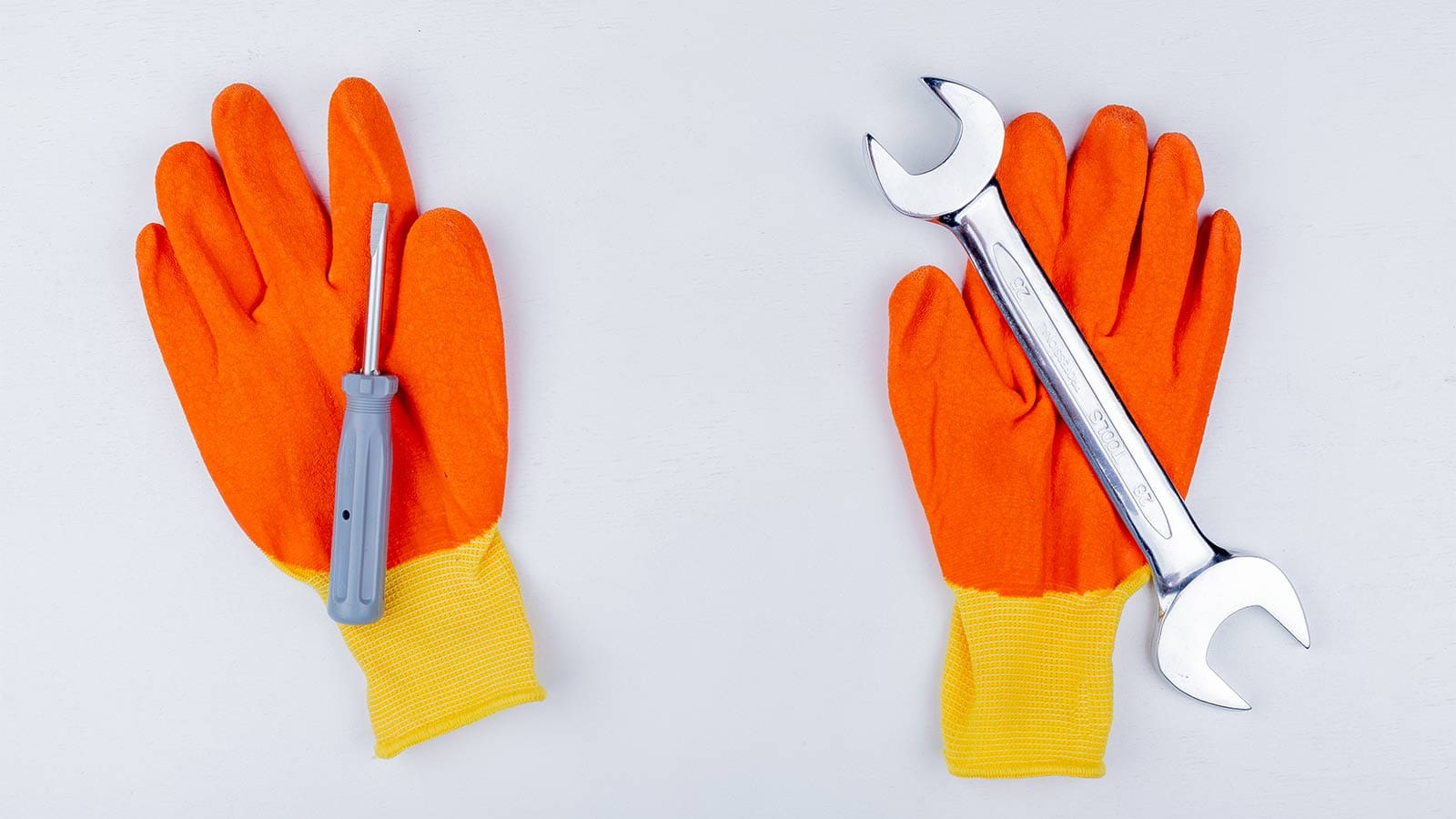The Complete Guide To Getting The Best Plumber Gloves
- Field Service Management
- 9 Min Read
Nothing about becoming a plumber is simple. You never know what you could face daily, making it an adventure. It’s usual to practice utilizing sensitive materials or instruments that could seriously injure people while working in small, greasy, dirty locations, hot temperatures, or tight spaces.
Plumbing work may be a dangerous and filthy task that calls for wearing gloves and plumbing boots. Not all gloves, meanwhile, are appropriate for plumbing work. The strongest, most flexible, and gloves with the most grip are those used by plumbers.
Over the past few years, over 37,000 accidents involving HVAC trades have been documented in the US.
Specialists advise using disposable nitrile or powder-free latex gloves for filthy plumbing projects. They recommend using cut-resistant leather gloves for more significant work exposing a plumber’s hands to PVC pipe’s sharp or rough edges.
Finally, they advise using chemical-resistant gloves when working with severe chemicals. Shops and internet retailers both carry all three varieties of plumber gloves.
Want to hear from plumbing professionals and business experts? Book a free demo with ZenPlumbing for a free consultation and one of the best field service management software available.
To assist plumbers and other trained tradespeople in locating the equipment and knowledge they require for safe and practical work, we compiled an article that covers the best plumber gloves, essential elements of the best gloves, different varieties of plumber gloves, and a buying guide for plumbers.
Here What We Cover
Best Plumber Gloves
It can be gratifying and pleasurable to work as a professional plumber. Using plumbing tools and paying close attention to safety is necessary for those in the plumbing trade. What protective clothing do plumbers don? First and foremost, they have protective plumbers’ gloves on their hands to protect them from harm and other dangers.
The ideal gloves for plumbers are composed of solid materials, like nitrile or latex. Additionally, they ought to be pliable and offer a secure grip.
The following excellent options should be your priority when looking for the best gloves for plumbers
Ultimate Nitrile Grip Gloves from Maxiflex (34-874)
These gloves, frequently chosen by plumbers for their durability and flexibility, are constructed of nitrile material. Since the gloves are light and thin, plumbers can feel anything they are working on with excellent tactile sensitivity. These gloves’ revolutionary micro-foam technology offers an enhanced grip and outstanding abrasion resistance, making them perfect for handling wet or oily materials.
SHOWA 730 Nitrile Cotton Flock-lined Chemical Resistant Glove
Nitrile and cotton materials make the glove explicitly built for chemical exposure protection. The gloves are a popular choice for plumbers who frequently work with hazardous chemicals because they are resistant to various chemicals, oils, and solvents. Their cotton lining makes the gloves even more comfortable, and their textured palms and fingertips provide superb control.
Ironclad Heavy Utility Work Gloves
These gloves are noted for their durability and toughness and comprise synthetic materials. The strengthened palms and fingertips of the gloves offer plumbers who operate with tools and heavy materials additional Protection. The adjustable wrist fastening on the gloves provides a secure fit and ensures they stay on during use. Because of their synthetic construction, the gloves have a good grip even when wet and are resistant to oil and water.

Use our free estimate template now
Make winning quotes in minutes—for any industry and any job.
Top Plumber Gloves for Those on a Budget
There are still some excellent options for gloves, even if you’re on a tight budget. The following are some of the top budget-friendly gloves for plumbers:
Atlas 370 Nitrile Tough Gloves
Plumbers might choose the Atlas 370 Nitrile Tough Gloves, constructed of nitrile, a material renowned for its strength and flexibility. The gloves’ seamless knit pattern and light weight make them easy to wear for extended durations. The gloves’ nitrile coating, which offers a firm grip and is durable against wear and punctures, makes them perfect for working with hard materials.
Grease Monkey Nitrile Coated Work Gloves
Made of nitrile material, which offers exceptional resistance to oils, solvents, and chemicals, these gloves are another cost-effective solution for plumbers. The nitrile coating on the gloves provides a good grip, and they are made with a ventilated back for Comfort during prolonged wear. The lightweight, flexible construction of the gloves makes them perfect for using tools and small parts.

CLC Custom Leathercraft model number 125M
Work gloves with a flexible grip constructed of synthetic materials by CLC Custom Leathercraft, model number 125M, are intended to be durable and affordable. The gloves’ synthetic leather palm and fingertips provide a solid grip, while the elastic spandex material ensures a snug and comfortable fit. Additionally breathable, the gloves.
The quality and durability of the gloves must be considered when purchasing inexpensive gloves. Cheaper gloves could be more accessible but might not provide the same Comfort and Protection as more expensive models. Even while shopping on a budget, it’s imperative to pick gloves that are both sturdy and cozy to wear.
Plumbers on a tight budget should also consider the kind of work they will be undertaking and any potential risks. Even on a tight budget, they should pick gloves resistant to chemical exposure if they work with severe chemicals, for instance.
Key Features Of The Best Plumber Gloves
When selecting the best gloves for their work, plumbers should consider a few other essential factors besides strength, flexibility, and grip.
- Comfort: Comfort is essential because plumbers frequently wear their gloves for prolonged periods. Gloves with moisture-wicking or breathable fabrics can help keep hands dry and comfortable. Furthermore, comfortable gloves that fit correctly and permit smooth mobility can lessen hand strain and enhance general Comfort.
- Chemical Resistance: Chemically resistant gloves are essential because plumbers frequently handle corrosive chemicals and solvents. Because nitrile gloves are often a wise choice because they provide outstanding resistance to chemicals and oils, chemical resistance can also be provided with latex gloves, but certain plumbers may have latex allergies.
- Puncture Resistance: Handling pointed or sharp objects is a standard part of plumbing, making puncture-resistant gloves essential. Nitrile gloves are frequently an excellent option because they are resistant to tears and punctures.
- Heat Resistance: Gloves that provide heat resistance can be helpful for plumbers because they may come into contact with hot pipes or materials. Kevlar or leather gloves are suitable options for gloves that can withstand heat.
- Cut Resistance: Because using sharp instruments during plumbing work is possible, gloves with this feature might add an extra layer of safety. Gloves made of Kevlar or mesh made of stainless steel can provide good cut resistance.
- Fit and Size: Uncomfortable and even deadly gloves can result from being too big or too small. Selecting gloves that are comfortable to wear and provide easy mobility is crucial. For a better fit, some gloves come in various sizes or have straps that can be adjusted.
Finally, while Comfort, chemical resistance, puncture resistance, heat resistance, cut resistance, and Size and fit should all be considered when choosing the finest gloves, durability, flexibility, and grip are the three most essential features for plumbers.
Why Should Plumbers Buy Good Quality Gloves?
When selecting the best gloves for their work, plumbers should consider a few other essential factors besides strength, flexibility, and grip.
- Comfort: Comfort is essential because plumbers frequently wear their gloves for prolonged periods. Gloves with moisture-wicking or breathable fabrics can help keep hands dry and comfortable. Furthermore, comfortable gloves that fit correctly and permit smooth mobility can lessen hand strain and enhance general Comfort.
- Chemical Resistance: Chemically resistant gloves are essential because plumbers frequently handle corrosive chemicals and solvents. Because nitrile gloves are often a wise choice because they provide outstanding resistance to chemicals and oils, chemical resistance can also be provided with latex gloves, but certain plumbers may have latex allergies.
- Puncture Resistance: Handling pointed or sharp objects is a standard part of plumbing, making puncture-resistant gloves essential. Nitrile gloves are frequently an excellent option because they are resistant to tears and punctures.
- Heat Resistance: Gloves that provide heat resistance can be helpful for plumbers because they may come into contact with hot pipes or materials. Kevlar or leather gloves are suitable options for gloves that can withstand heat.
- Cut Resistance: Because using sharp instruments during plumbing work is possible, gloves with this feature might add an extra layer of safety. Gloves made of Kevlar or mesh made of stainless steel can provide good cut resistance.
- Fit and Size: Uncomfortable and even deadly gloves can result from being too big or too small. Selecting gloves that are comfortable to wear and provide easy mobility is crucial. For a better fit, some gloves come in various sizes or have straps that can be adjusted.
Finally, while Comfort, chemical resistance, puncture resistance, heat resistance, cut resistance, and Size and fit should all be considered when choosing the finest gloves, durability, flexibility, and grip are the three most essential features for plumbers.
What Are The Different Types Of Plumber Gloves?
The tools and substances that plumbers work with are diverse, ranging from metal pipes and sharp objects to corrosive chemicals and unhygienic waste. They need gloves that offer sufficient Protection from a variety of risks. Three types of gloves that plumbers frequently use are listed below:
- Gloves for drain cleaning – These gloves are made especially for plumbers who handle chemicals for drain cleaning. They offer chemical resistance and are often composed of PVC or neoprene. These gloves, which may be used for commercial and home plumbing operations, also have an extended cuff to further protect the forearm.
- Gloves resistant to cuts – These gloves are perfect for plumbers who work with cutting equipment or materials, such as metal pipes or saws. They provide good Protection from scratches and punctures since they are often built with materials resistant to tearing, like steel mesh or Kevlar. Cut-resistant gloves are available in various designs and sizes to suit the requirements of multiple plumbers.
- Plumbers who operate with dangerous chemicals or substances should wear chemical-resistant gloves. They typically consist of rubber or nitrile and resist various substances, such as acids, bases, and solvents. Chemical-resistant gloves are available in multiple lengths and densities, offering differing degrees of Protection.
It’s significant to remember that only some types of gloves are appropriate for some plumbing applications. Plumbers should constantly consider the substances and materials they will be dealing with and choose gloves that offer the necessary safety.
To ensure optimal productivity and safety while working, plumbers should also consider the degree of Comfort, flexibility, and grip each glove style gives.
Get posts like this in your inbox.
Keep learning how to run a 5-star business with our bi-weekly newsletter.
Complete Buying Guide For Plumber Gloves
When shopping for gloves for plumbing work, to ensure that you choose the appropriate gloves for your needs, it is crucial to take into account the following factors:
Material
Nitrile or latex gloves are strong, waterproof to chemicals, and puncture-resistant. Although leather gloves are strong, they might need more grip.
Gloves can also be manufactured of other synthetic materials such as polyurethane, PVC, neoprene, nitrile, latex, and leather. Plumbers should select the material that best fits their unique requirements and the jobs they will be carrying out.
A chemical-resistant glove made of neoprene would be the ideal choice, for instance, if a plumber will be handling severe chemicals.
Size
For the best Protection and Comfort, gloves should fit snugly. Gloves that are too loose can fall off or allow harmful substances inside.
While gloves that are too tight might be uncomfortable and limit movement. Plumbers should measure their hands and use the manufacturer’s sizing chart to determine the proper Size.
Protection
Depending on their work type, plumbing contractors may need varying protection levels. Chemical-resistant gloves are recommended for plumbers dealing with potentially dangerous chemicals or materials, while cut-resistant gloves are recommended for those using sharp tools or materials.
Long-cuffed gloves may be necessary for plumbers working with drains or sewers to protect their forearms.
Grasp
Maintaining a firm grasp is essential while handling slippery or damp materials to avoid slips, trips, and falls. A good grip can be had from gloves with rough surfaces or coatings, like nitrile or latex.
Comfort and flexibility
Because plumbers frequently wear their gloves for prolonged periods, selecting gloves with both qualities is critical. Gloves of nitrile, latex, or neoprene offer an excellent compromise between toughness and flexibility.
Care Maintenance Required To Keep Your Plumber Gloves In Top Condition
Plumber gloves can ensure their effectiveness and extend their lifespan with the proper maintenance and upkeep. Here are some suggestions for maintaining plumber’s gloves:
Frequently clean gloves
To remove dirt, debris, or bacteria, gloves must be cleaned and disinfected thoroughly after every use. Warm water and a light detergent or soap can wash gloves.
Store gloves appropriately
Plumbers should not expose their gloves to direct sunshine. They need to be stored in a dry, cold location. They must also ensure that wet gloves are thoroughly dried to prevent bacteria growth and maintain their shape.
Inspect the condition of your gloves consistently
Plumbers should inspect gloves for tears, holes, or any other type of damage each time before wearing them.
Worn-out gloves should be discarded and replaced immediately.
Periodically replace your gloves.
Even the toughest gloves will eventually become ineffective due to wear and tear. When a pair of plumbers’ gloves begin to exhibit indications of deterioration or stop offering sufficient Protection, it’s time to replace them.

Explore a better way to grow your business. Book a free demo now!
Get organized, win jobs, and wow customers.
Book A Free Demo with ZenTrades Today!
Related Reading
Why Your Field Software Management Software Needs QuickBooks Integration
ZenTrades Why Your Field Service Management Software Needs QuickBooks Integration Read More Request Demo...
Read MoreZenTrades How To Manage Electrical Service Agreements Like...
Read MoreZenTrades The Best 5 Jobber Alternatives In 2023...
Read More

